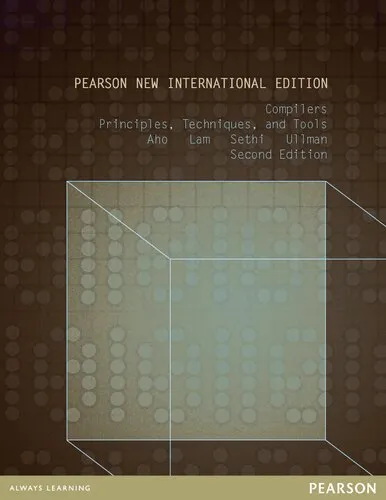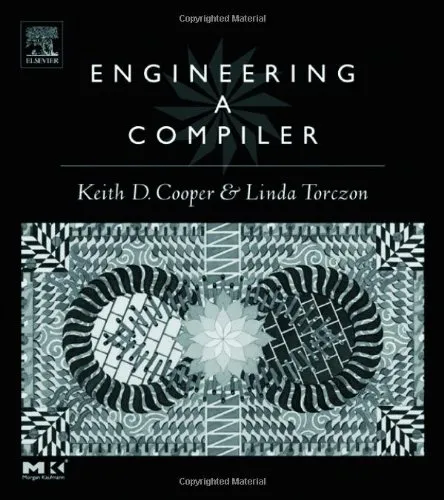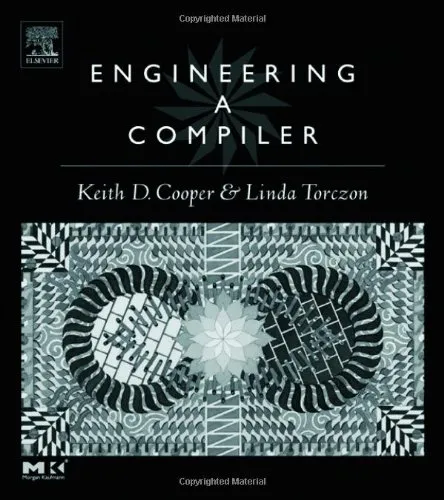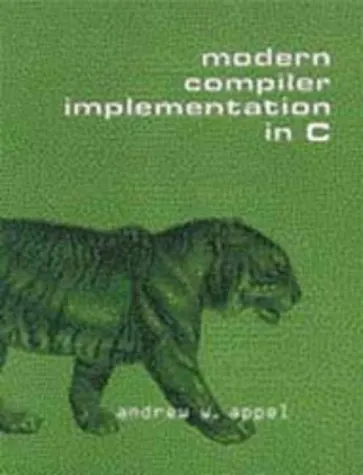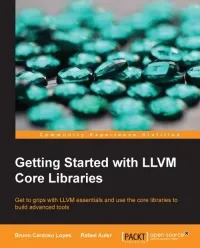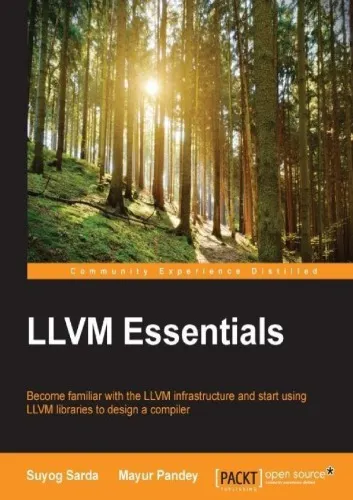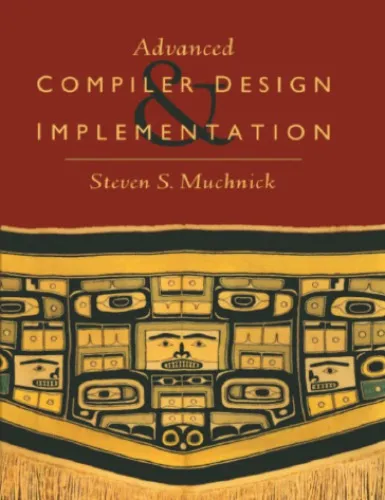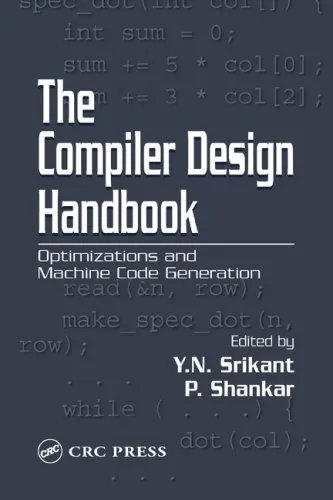Compilers: Pearson New International Edition: Principles, Techniques, and Tools
4.6
بر اساس نظر کاربران

شما میتونید سوالاتتون در باره کتاب رو از هوش مصنوعیش بعد از ورود بپرسید
هر دانلود یا پرسش از هوش مصنوعی 2 امتیاز لازم دارد، برای بدست آوردن امتیاز رایگان، به صفحه ی راهنمای امتیازات سر بزنید و یک سری کار ارزشمند انجام بدینکتاب های مرتبط:
مقدمهای بر کتاب 'Compilers: Principles, Techniques, and Tools'
کتاب 'Compilers: Pearson New International Edition: Principles, Techniques, and Tools' یک منبع بینظیر در زمینه Compiler Design است که به دلیل جامعیت و عمق اطلاعات خود، به عنوان "کتاب اژدها" در میان جامعه برنامهنویسان و مهندسان نرمافزار شناخته میشود.
خلاصه دقیق کتاب
این کتاب با تألیف 'A.V. Aho, Monica S. Lam, R. Sethi, و Jeffrey D. Ullman' به بررسی جامع و دقیق مباحث مربوط به Compiler، از اصول پایهای تا تکنیکهای پیشرفته در طراحی و پیادهسازی آن، میپردازد. این کتاب به پنج بخش عمده تقسیم میشود که هر بخش به جزئیاتی از فرآیند کار با Compiler و ابزارهای مختلف برنامهنویسی مرتبط میپردازد.
در ابتدا، به معرفی اصول اولیه و مفاهیم پایهای پرداخته میشود. سپس در بخش بعدی، طراحی Lexical Analyzer و دستورالعملهای مربوط به آن بررسی میگردند. پس از این، تحلیل Semantic و تکنیکهای بهینهسازی کد در Compiler تشریح میشود. نهایتاً، در بخشهای پایانی به موضوعات پیشرفتهای همچون Code Generators و روندOptimization Compiler ها پرداخته میشود و پروژهها و مثالهای متعددی برای درک بهتر مفاهیم ارائه شدهاند.
نکات کلیدی
- ایجاد درک عمیق از نقش Compiler در فرآیند توسعه نرمافزار
- شرح کاملی از مراحل مختلف Compiler، شامل Lexical Analysis، Syntax Analysis و Semantic Analysis
- ارائه استراتژیهای بهینهسازی کد برای اجرای سریعتر و موثرتر
- بحث درباره الگوریتمهای جدید و بهروز در دنیای Compiler Design
نقلقولهای مشهور از کتاب
"زبانها و تکنیکهای برنامهنویسی ممکن است در طول زمان تغییر کنند، اما اصول طراحی Compiler همواره پایدار و ثابت میمانند."
"Compilerها قلب هر سیستم نرمافزاری را تشکیل میدهند که انتقال دستورات انسانی به زبانی قابل فهم برای ماشین را میسر میسازد."
چرا این کتاب مهم است؟
این کتاب نه تنها به عنوان یک منبع آموزشی برای دانشجویان و پژوهشگران حوزه علوم کامپیوتر بسیار مهم است، بلکه دستورالعملها و تکنیکهای آن برای برنامهنویسان حرفهای که به دنبال ارتقای سطح دانش و مهارتهای خود در زمینه Compiler Design هستند، نیز بسیار مفید است. با پوشش جامع اصول و تکنیکها، این کتاب خوانندگان را برای رویارویی با چالشهای پیچیده در طراحی و پیادهسازی Compiler آماده میسازد. بهرهگیری از مثالهای کاربردی و واقعی، این متن را به یک همراه قدرتمند در مسیر یادگیری و کار حرفهای تبدیل کرده است.
Introduction to "Compilers: Pearson New International Edition: Principles, Techniques, and Tools"
Compiler design is a sophisticated and intricate field that plays a crucial role in the world of computer science. "Compilers: Pearson New International Edition: Principles, Techniques, and Tools," also known fondly as the "Dragon Book," is a comprehensive guide that systematically explores the multitude of concepts required to build a compiler. As a seminal resource by A.V. Aho, Monica S Lam, R. Sethi, and Jeffrey D. Ullman, this book provides exhaustive coverage of compiler theory, whilst furnishing readers with insights into practical compiler design and construction.
Detailed Summary of the Book
The journey through the "Dragon Book" starts with an introduction to compilers, their function, and the underlying principles that define how they operate. Readers are introduced to the concepts of lexical analysis and syntax analysis, which are explained thoroughly to establish a solid understanding of how source code is broken down and parsed. This serves as a precursor to chapters elucidating semantic analysis, which ensures that given source code conveys meaningful instructions.
As readers progress, they encounter an in-depth discussion on intermediate code generation and run-time environments, bridging the gap between high-level programming languages and machine code. Here, the nuances of data flow analysis and optimization techniques are meticulously covered to illuminate the processes that enable efficient execution of programs.
The latter sections delve into code generation and optimization, which are pivotal in translating intermediate code into efficient machine code, ensuring that final executable programs run optimally. Throughout the text, reference to real-world examples aids in conveying abstract concepts, making the knowledge applicable to practical scenarios.
Key Takeaways
One of the primary takeaways from this book is the comprehensive manner in which complex compiler design topics are deconstructed. Readers gain a robust framework of understanding, from the high-level architecture of compilers to the minute details of code optimization. The book's structure ensures that learners acquire a step-by-step mastery of the foundational algorithms and implementation strategies fundamental to compiler construction.
Furthermore, the book teaches the skill of algorithmic thinking and systematic problem-solving. By understanding compilers, programmers and designers hone their capacity to think like a compiler, optimizing code and improving software design and performance.
Famous Quotes from the Book
- "Designing a compiler is a challenging task and very often serves as the capstone course for undergraduate students in computer science."
- "Compilers are majestic in offering a tapestry of methodologies and they require equal parts of theoretical insight and practical application."
- "The dragon slain by the compiler construction process is the complexity involved in bridging the gap between high-level language design and machine-level implementation."
Why This Book Matters
"Compilers: Pearson New International Edition: Principles, Techniques, and Tools" holds its place as a definitive text because it lays a strong theoretical and technical foundation indispensable for anyone delving into the realm of compiler construction. The book's enduring authority is evidenced by its widespread adoption in academia and industry alike, serving as a key reference text for both students and professionals.
With the rapid evolution of programming languages and computing paradigms, understanding the principles that underlie compiler design remains essential. This book not only equips readers with the knowledge to build robust compilers but also instills an appreciation for the craftsmanship involved in engineering software that serves as a critical bridge between human logic and machine execution.
دانلود رایگان مستقیم
شما میتونید سوالاتتون در باره کتاب رو از هوش مصنوعیش بعد از ورود بپرسید
دسترسی به کتابها از طریق پلتفرمهای قانونی و کتابخانههای عمومی نه تنها از حقوق نویسندگان و ناشران حمایت میکند، بلکه به پایداری فرهنگ کتابخوانی نیز کمک میرساند. پیش از دانلود، لحظهای به بررسی این گزینهها فکر کنید.
این کتاب رو در پلتفرم های دیگه ببینید
WorldCat به شما کمک میکنه تا کتاب ها رو در کتابخانه های سراسر دنیا پیدا کنید
امتیازها، نظرات تخصصی و صحبت ها درباره کتاب را در Goodreads ببینید
کتابهای کمیاب یا دست دوم را در AbeBooks پیدا کنید و بخرید
1709
بازدید4.6
امتیاز0
نظر98%
رضایتنظرات:
4.6
بر اساس 0 نظر کاربران
Questions & Answers
Ask questions about this book or help others by answering
No questions yet. Be the first to ask!
